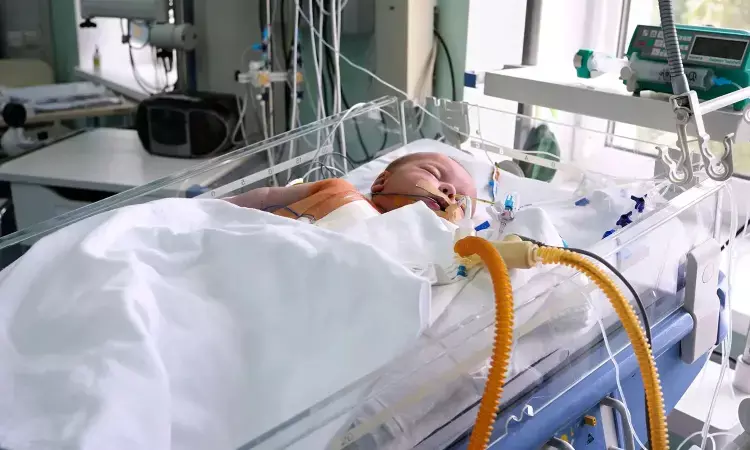- Home
- Medical news & Guidelines
- Anesthesiology
- Cardiology and CTVS
- Critical Care
- Dentistry
- Dermatology
- Diabetes and Endocrinology
- ENT
- Gastroenterology
- Medicine
- Nephrology
- Neurology
- Obstretics-Gynaecology
- Oncology
- Ophthalmology
- Orthopaedics
- Pediatrics-Neonatology
- Psychiatry
- Pulmonology
- Radiology
- Surgery
- Urology
- Laboratory Medicine
- Diet
- Nursing
- Paramedical
- Physiotherapy
- Health news
- Fact Check
- Bone Health Fact Check
- Brain Health Fact Check
- Cancer Related Fact Check
- Child Care Fact Check
- Dental and oral health fact check
- Diabetes and metabolic health fact check
- Diet and Nutrition Fact Check
- Eye and ENT Care Fact Check
- Fitness fact check
- Gut health fact check
- Heart health fact check
- Kidney health fact check
- Medical education fact check
- Men's health fact check
- Respiratory fact check
- Skin and hair care fact check
- Vaccine and Immunization fact check
- Women's health fact check
- AYUSH
- State News
- Andaman and Nicobar Islands
- Andhra Pradesh
- Arunachal Pradesh
- Assam
- Bihar
- Chandigarh
- Chattisgarh
- Dadra and Nagar Haveli
- Daman and Diu
- Delhi
- Goa
- Gujarat
- Haryana
- Himachal Pradesh
- Jammu & Kashmir
- Jharkhand
- Karnataka
- Kerala
- Ladakh
- Lakshadweep
- Madhya Pradesh
- Maharashtra
- Manipur
- Meghalaya
- Mizoram
- Nagaland
- Odisha
- Puducherry
- Punjab
- Rajasthan
- Sikkim
- Tamil Nadu
- Telangana
- Tripura
- Uttar Pradesh
- Uttrakhand
- West Bengal
- Medical Education
- Industry
Early prostacyclin in diaphragmatic hernia tied to less life support use in newborns: JAMA

USA: Early prostacyclin (PGI2) therapy in newborns with a congenital diaphragmatic hernia (CDH) is associated with a decrease in the need for extracorporeal life support (ECLS), according to a cohort study published in JAMA Pediatrics.
Based on a registry, the researchers found that prostacyclin did not affect in-hospital mortality (29.9% vs 29.3%).
A diaphragmatic hernia is a congenital disability that prevents the complete development of the baby's lungs, causing difficulties for the baby at birth. According to CDC, about 1 in every 3,600 babies is born with a diaphragmatic hernia. The authors noted that neonates with a congenital diaphragmatic hernia who receive ECLS have 2.7 to 4 times higher mortality after considering disease severity.
Strategies to mitigate early cardiopulmonary deterioration and reduce ECLS use are essential for reducing mortality. However, effective medical treatment of CDH-associated pulmonary hypertension presents a challenge because these patients respond differently to vasoactive agents than those with pulmonary hypertension due to other pathophysiologic processes.
"While medications such as inhaled nitric oxide and sildenafil have undergone retrospective evaluation, prostacyclins have not been studied properly," the researchers wrote in their study. "Prostacyclins reduce pressure in the pulmonary arteriolar bed by vasodilation and may be titrated to clinical effect. There is limited prior literature regarding prostacyclin therapy among CDH neonates ."
To fill this knowledge gap, Akila B. Ramaraj, Seattle Children's Hospital, Seattle, Washington, and colleagues aimed to evaluate the association of early prostacyclin therapy with ECLS use and outcomes among CDH patients in a cohort study from CDHSG (CDH Study Group) registry of patients born from 2007 to 2019.
Patients were from worldwide 88 different tertiary pediatric referral centres who contributed data to the CDHSG. Propensity score matching was performed using birth weight, estimated gestational age, 1-minute and 5-minute Apgar scores, transfer status, degree of pulmonary hypertension, and highest and lowest partial pressure of arterial carbon dioxide in the life's first 24 hours as covariates to produce a matched cohort of unexposed and exposed patients. Patients admitted within the first week of life were included in the study.
Early PGI2 therapy was defined as PGI2 initiation within the life's first week. If PGI2 was started before ECLS, patients who received extracorporeal life support were included in the early PGI2 group.
The patient's proportion receiving ECLS in the unexposed and exposed groups was determined (primary outcome).
The study led to the following findings:
- Of 6227 patients who met inclusion criteria (mean gestational age, 37.4 weeks; 42% female), 3.3% received early PGI2 therapy.
- ECLS was used in 22.2% of patients who received PGI2 and 27.9% who did not.
- Following propensity score matching, there were 147 patients in the treatment and control groups. 23.3% received PGI2, and 42.9% did not receive ECLS.
- Those who received prostacyclin were less likely to receive ECLS and had a shorter mean duration of ECLS (8.6 days vs 12.6 days); the authors, however, found no significant difference in in-hospital mortality.
The researchers found a decreased use of ECLS and decreased ECLS duration in CDH patients who started PGI2 therapy during the life's first week.
"These findings identify a potential advantage of early prostacyclin therapy in this population," they concluded.
Reference:
Ramaraj AB, Rice-Townsend SE, Foster CL, et al. Association Between Early Prostacyclin Therapy and Extracorporeal Life Support Use in Patients With Congenital Diaphragmatic Hernia. JAMA Pediatr. Published online April 10, 2023. doi:10.1001/jamapediatrics.2023.0405
Dr Kamal Kant Kohli-MBBS, DTCD- a chest specialist with more than 30 years of practice and a flair for writing clinical articles, Dr Kamal Kant Kohli joined Medical Dialogues as a Chief Editor of Medical News. Besides writing articles, as an editor, he proofreads and verifies all the medical content published on Medical Dialogues including those coming from journals, studies,medical conferences,guidelines etc. Email: drkohli@medicaldialogues.in. Contact no. 011-43720751


